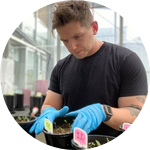Project Results
With support from experiment, we were not only able to collect data from agricultural environments but across a diverse range of ecosystems. With this, we developed the database of arbuscular mycorrhizal (AM) fungi in Australia, AusAMF. Until now, Australia was the most undersampled continent for soil AM fungal diversity, apart from Antarctica. AusAMF represents a foundational new resource that addresses this knowledge gap. This dataset, comprising AM fungal community data from 610 locations across mainland Australia and Tasmania, enables detailed exploration of fungal diversity, community composition, and the ecological drivers of AM fungal distributions. The AusAMF database provides a critical foundation for advancing research into plant-microbe interactions, ecosystem processes, and evidence-based management and conservation strategies in Australia and beyond.
About This Project
Plants co-evolved with a group of soil fungi called arbuscular mycorrhizal fungi that support plant nutrient uptake and soil health. The vast potential of these fungi in sustainable agriculture is still unrealized. This citizen science project engages with farmers and land managers to submit soil samples from around Australia to map these fungi on a continental scale, and investigate how differences in agricultural management affect them.
Ask the Scientists
Join The DiscussionWhat is the context of this research?
Most plants form a close relationship with a group of fungi called arbuscular mycorrhizal fungi, or AM fungi for short. The fungi give plants access to important resources like phosphorus and water, and they can also help plants defend themselves against pests. AM fungi contribute to overall soil health, they reduce soil phosphorus losses and are important for soil structure.
There are many hundreds of species of AM fungi. Just as different species of animals and plants do different things in their ecosystems, AM fungal species differ in their 'functions' in the soil, and they do different things for the plants they connect with. For example, some fungi might be particularly good at providing access phosphorus, or enhancing their resistance to insects.
What is the significance of this project?
The enormity of the challenge of feeding our growing population sustainably has become increasingly apparent. Fundamental to meeting that challenge is growing food and minimizing damage to our soil ecosystems. Despite the vast potential of AM fungi, we remain limited by our lack of data. While research suggests agricultural practices have a strong influence on fungi, our knowledge of how agriculture affects fungal diversity across Australia is virtually absent.
If we are to manage land that supports beneficial fungi, we first need to map the current state of AM fungal community composition across Australian agro-ecosystems. If we can understand this, we will be equipped to manage these fungi to support sustainable agriculture.
What are the goals of the project?
This project will:
(i) Survey AM fungal communities from agricultural environments across Australia to map their diversity and community composition;
(ii) explore how the composition and diversity of AM fungi are influenced by geography and climate;
(iii) identify how different agricultural management practices impact AM fungal community composition.
To achieve this, we engage with farmers across Australia to submit their soil samples over the next year. Participants sign up via the Dig Up Dirt website and complete a simple form so we have information on land management. We then post a sampling kit and a pre-paid satchel to send the soil. Using DNA metabarcoding, we sequence the soil DNA to characterize the fungal communities. Research outcomes will be published.
Budget
The project is partly self-funded and has some support from the Australian Research Council. However, we require funding if we are to process and sequence all the samples we have coming from across the vast and diverse Australian landscape. Sequencing represents the most significant cost to the project.
Without the funding requested here, the number of samples we can analyze is limited. The project already has garnered so much momentum and interest from farmers, so it would be a loss not to maximize this as much as possible to gather as much data as we can. The project presents an opportunity to comprehensively map AM fungal diversity across agro-ecosystems of Australia for the very first time.
Endorsed by
 Project Timeline
Project Timeline
The project is expected to run for around 12 months for soil sample collections and analysis. There is some flexibility around completion of data analysis, although for the student who is working on parts of the project there are hard deadlines that must be met.
Jan 10, 2023
Project Launched
Mar 31, 2023
Complete call for soil samples.
Apr 30, 2023
Extract DNA from soil samples and check sample quality.
Jun 30, 2023
Sequence DNA samples.
Jun 30, 2023
Analyse soil for nutrient data (carbon, nitrogen, phosphorus etc.)
Meet the Team
Affiliates
Adam Frew
I’m interested in anything to do with arbuscular mycorrhizal fungi.
I obtained my PhD from the Hawkesbury Institute for the Environment in 2017, where I studied the impacts of the soil environment on root-feeding insects. I was then awarded an independent research fellowship at Charles Sturt University in Wagga Wagga where I continued to pursue my interests in belowground ecology by exploring aspects of how arbuscular mycorrhizal fungi affect plant performance and responses to insect herbivory. After this fellowship, I took up an ongoing faculty position at the University of Southern Queensland teaching into a variety of environmental and sustainability subjects while continuing my research into mycorrhizal ecology.
I recently returned to the Hawkesbury Institute for the Environment at Western Sydney University to continue exploring mycorrhizal fungi, soil ecology, and sustainable agriculture. I'm lucky to get to work alongside such an amazing group of scientists.
Project Backers
- 8Backers
- 100%Funded
- $4,526Total Donations
- $565.75Average Donation



